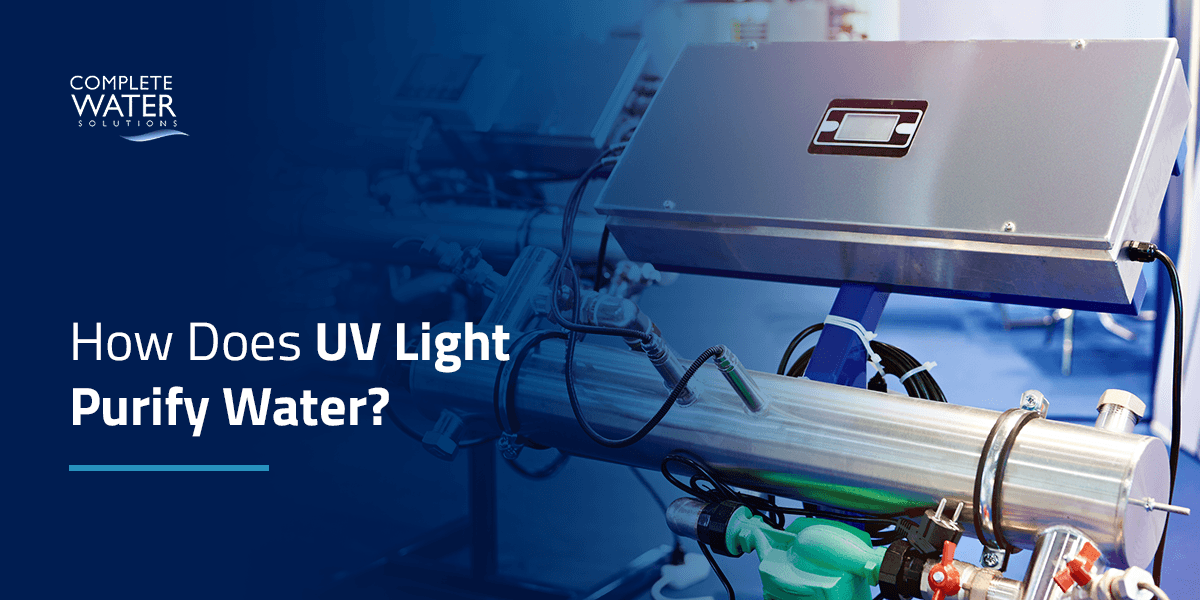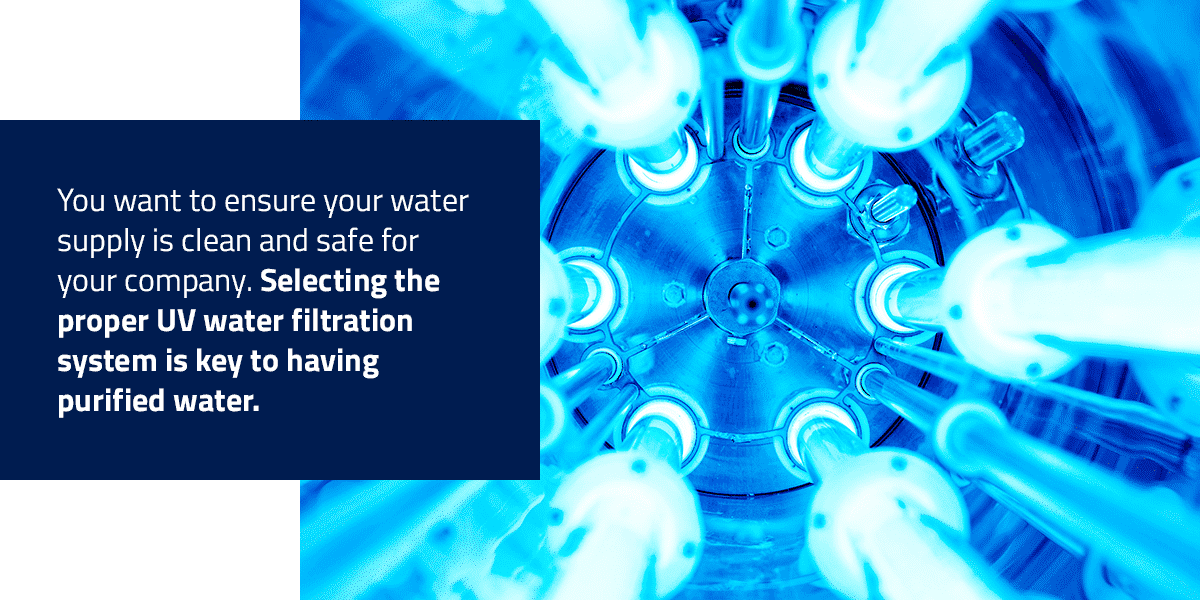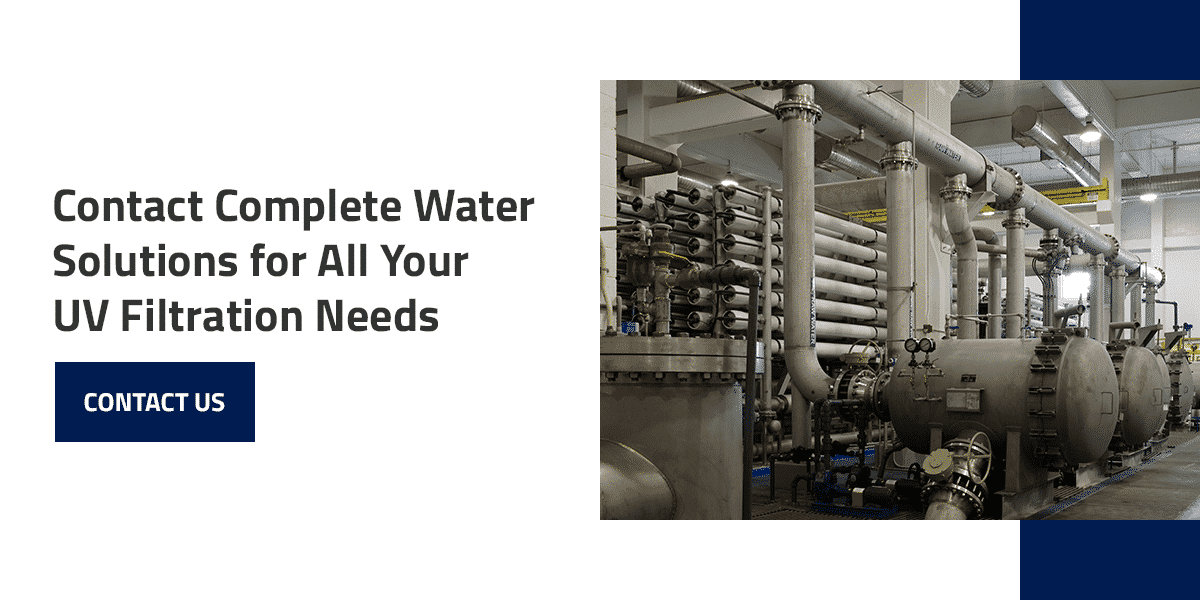How Does UV Light Purify Water?
How Does UV Light Purify Water?

Companies can select from various methods to purify water in their facility. Different applications require certain materials and bacteria to be disinfected from the water supply. If bacteria is a concern for your company and it’s imperative you have a clean water supply, selecting a water filtration method that does the best job purifying your water is essential.
If you’re searching for a method that is safe and utilized by facilities of various industries, consider using a UV light water purifier. Learn more about this water filtration process and whether a UV disinfection system for water treatment is the right method for your building.
Table of Contents
- What Is Ultraviolet (UV) Water Filtration?
- How Does UV Water Filtration Work?
- Types of UV Water Filtration Systems
- What Does UV Disinfection Impact?
- What Doesn’t UV Disinfection Impact?
- UV Purification vs. Chemical Disinfection
- When to Use UV Water Filtration
- Contact Complete Water Solutions for All Your UV Filtration Needs
What Is Ultraviolet (UV) Water Filtration?
An ultraviolet water system has a filtration process that uses ultraviolet light to purify the water supply. The UV light sits inside a chamber that is part of the water system in your company’s building. Water runs through the chamber and is exposed to the UV wavelength, which deactivates the organisms in the water. The deactivated bacteria and other organisms are no longer able to replicate, which makes them useless and unable to impact people negatively.
This filtration system is crucial for water supplies that are known to have bacteria, viruses and other organisms that are harmful when people ingest them. These organisms can make people sick and replicate once they enter the digestive system.
Pros of UV Water Filtration
UV water systems are a popular option for industrial and commercial businesses because of their effectiveness. Check out some of the pros of an ultraviolet light water purification system:
- The UV light water purifier is a chemical-free disinfection option for your water supply.
- A UV light system has no effect on the taste or color of the water after it passes through the chamber.
- This filtration system is an energy-efficient option, using a similar amount of wattage as a common lightbulb.
- A UV light water filtration system works quickly, so you can access clean water almost instantly.
- It’s simple to replace the UV lightbulb and maintain the filtration system.
- Since the UV light is secure inside of the chamber, it is safe to use.
Cons of UV Water Filtration
This water filtration method may not be the best option for all facilities. Learn about some of the cons that are associated with UV light water purifiers:
- The purifier will not remove particles like fluoride, rust, pesticides and other impurities in the water. You will need to use another form of water treatment to tackle other particles or muddy water.
- The UV water disinfection system works on electricity. If the power goes out or is unavailable at your company’s building, your facility will not have access to a clean water supply.
How Does UV Water Filtration Work?
The ultraviolet water purifier system works by exposing bacteria, viruses and other waterborne organisms to a certain wavelength of UV light. The water passes through a chamber that contains a UV lamp emitting a germicidal frequency or wavelength that impacts the living organisms in the water.
The ultraviolet light alters the DNA of these organisms, rendering them unable to reproduce and harm humans when they ingest the organism. Once the water is exposed to UV waves and the bacteria and other organisms are deactivated, the water enters your facility for use.

Types of UV Water Filtration Systems
You want to ensure your water supply is clean and safe for your company. Selecting the proper UV water filtration system is key to having purified water. With the wide variety of industries and applications that companies use water for, you should narrow down your options to specific types of UV filtration systems.
Different types of UV water filtration systems include:
- Industrial UV water filtration
- Commercial UV water filtration
- Single faucet UV water systems
- UV system for water treatment plant
The location and type of operations you’re conducting will determine the type of UV purifier you install at your facility. Another factor to consider is whether you must install a class A or class B UV water system.
Class A
A class A UV water system is best for facilities that use well water in their water system. Well water can include water from lakes, rivers, streams and more. This type of water typically carries bacteria, viruses and other common organisms. The class A UV system is the best option to treat clear water, not dirty or cloudy water.
Class B
A class B UV water system is a great option for water that comes from treated water facilities or municipal water. This type of purification system helps further disinfect bacterial-treated water that is safe for the public. Class B systems help decrease the number of organisms that normally occur in treated water.
It’s essential that these microorganisms are impacted in your facility’s water supply before it is used.
What Does UV Disinfection Impact?
Ultraviolet water purifiers can impact the following bacteria and organisms:
- Fungi
- Algae
- Cryptosporidium
- Salmonella
- E. coli
- Cholera
- Hepatitis B
- Giardia
- Streptococcus
- Mycobacterium tuberculosis
- Dysentery bacilli
What Doesn't UV Disinfection Impact?
A UV disinfection treatment will not remove particles from the water supply. The system doesn’t filter anything out from the water — rather, it purifies it and cleans clear or pretreated water. Items that can make their way into your water supply from your facility, like dirt, dust, metal and other materials, are not impacted by a UV disinfection water treatment.
UV Purification vs. Chemical Disinfection
Both UV light and chlorine are effective in purifying water supplies. The main difference between the two is using chemicals versus opting for a more environmentally friendly option. Learn more about the differences between UV light treatment and chemical treatment with chlorine:
- Chemical disinfection: This common option is used in municipal water to kill bacteria and some viruses. While it’s an effective option, it can be expensive and does not impact all types of bacteria and viruses. Chlorine will also impact the taste of a water supply.
- UV light: Ultraviolet light systems are reliable, chemical-free, cost-effective, safe and they impact more than chlorine.
When to Use UV Water Filtration
You should use a UV light for a water system in your facility to ensure your water is safe, especially if you know it is well water. The system will work efficiently and last a long time. The life of a UV lamp in a water purification system is around a year, so you’ll only have to replace the bulb annually.
Contact Complete Water Solutions for All Your UV Filtration Needs
Is your commercial or industrial facility in need of a UV water disinfection system? Contact Complete Water Solutions to learn about the ultraviolet light purification solutions we can provide or schedule a time to install a water treatment system.


